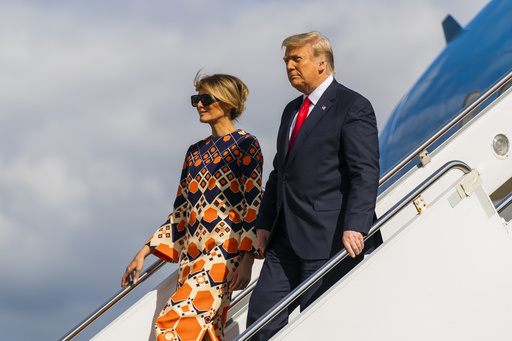
In a significant political event, Donald Trump is set to make a brief return to the White House, granted an invitation by Democratic President Joe Biden. This meeting occurs before Trump officially takes office on Inauguration Day as the incoming President. The circumstances surrounding their encounter are noteworthy given the competitive history between them. In the 2020 election, Biden defeated Trump, who notably declined to invite Biden to the White House after the transition. Trump became the first president to leave the capital before the inauguration of his successor since Andrew Johnson’s departure during Ulysses S. Grant’s inauguration in 1869.
Biden’s tenure as president has involved a unique dynamic with Trump, as he has spent nearly 15 months actively campaigning against him while insisting that Trump poses a considerable threat to democracy and American values. As the election approached, Biden exited the race in July and subsequently endorsed Vice President Kamala Harris, who eventually faced her own election defeat. Their upcoming meeting on Wednesday will mark a rare occurrence in American history – the first time since 1992 that an outgoing president meets with an incoming rival. The last instance of this was when George H.W. Bush had a sit-down with Bill Clinton after their heated electoral battle.
During their past meeting, Bush and Clinton engaged in discussions about policy before proceeding to join their transition teams in the Roosevelt Room. Clinton later characterized their interaction as highly positive and noted Bush’s helpfulness. Such transitions between outgoing and incoming presidents have traditionally ranged from cordial to tense. However, Biden has pledged to facilitate a smooth handover, which he deems crucial for unifying the nation. Trump will attend the meeting alongside his wife, Melania Trump, who will transition into the role of First Lady once again. Biden, in inviting Trump, reassured him of his commitment to work collaboratively with Trump’s team for the benefit of the country.
Historian Jim Bendat remarked on the healthy tradition of face-to-face meetings between transitioning presidents, indicating that Biden’s approach serves to reaffirm longstanding democratic customs. He expressed satisfaction with the Democrats’ decision to take a high-road approach, emphasizing the importance of institutional continuity and cooperation.
Trump is no stranger to this type of interaction. Following the 2016 election, he engaged in an extended discussion with then-President Barack Obama. That meeting lasted over 90 minutes and was described as cordial despite the contentious nature of the election outcome that challenged Obama’s legacy. During that encounter, Obama assured Trump of his administration’s support, stating that Trump’s success would translate to national prosperity. Despite initially appearing restrained and respectful, Trump’s tone shifted dramatically just months later when he made baseless allegations that Obama had wiretapped Trump Tower.
Historical accounts indicate that during the transition, Trump’s team appeared less inclined to engage in the traditional transition process and did not approach their new responsibilities with the same reverence displayed by previous administrations. The inquiries from Trump’s aides focused less on future duties and more on finding accommodations in Washington.
While inviting a successor to a personal meeting has become customary, it is not mandated as part of the official transition process. Historical precedents highlight that some of America’s founders did not engage in such practices. For instance, George Washington did not meet with his successor John Adams before transitioning out of office, and Adams further bypassed Jefferson by declining to attend his inauguration after taking office.
In later years, notable transitions have included interactions between outgoing and incoming presidents. Martin Van Buren hosted William Henry Harrison in 1841 after Harrison’s decisive electoral victory. George W. Bush welcomed Obama to the White House in 2008, highlighting the occasion as a hallmark of American history. Similarly, Bush’s meeting with Al Gore just after the contentious 2000 election demonstrated a commitment to national unity despite political rivalries. As Biden and Trump navigate their unique relationship, their previous phone conversation reveals an ongoing discourse, although a face-to-face meeting between Trump and Harris is not scheduled.
